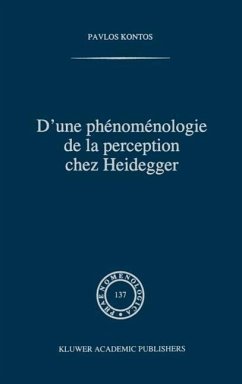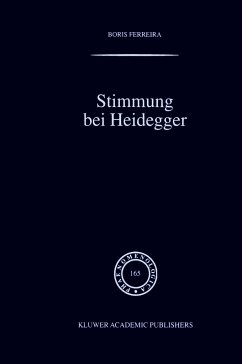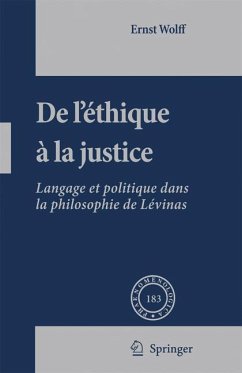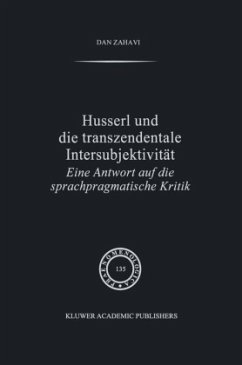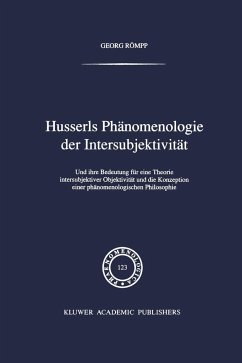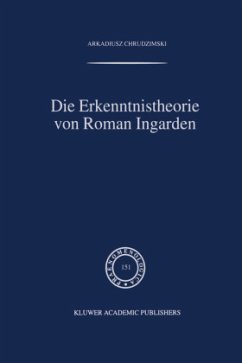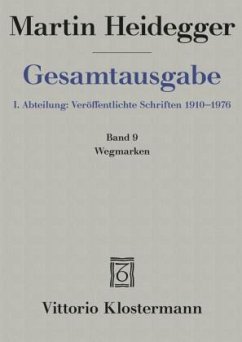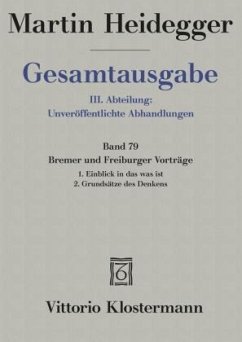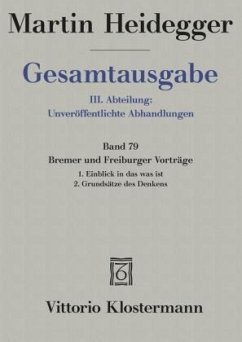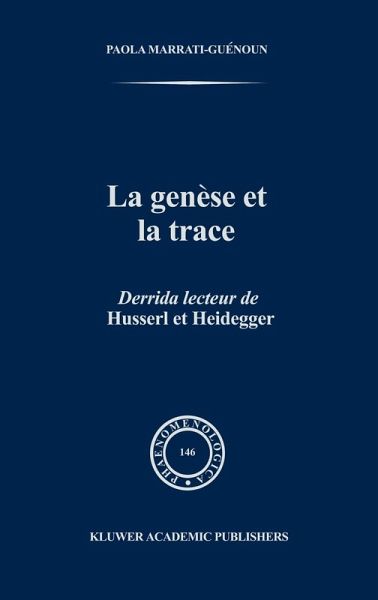
La Genèse et la Trace
Derrida lecteur de Husserl et Heidegger
Versandkostenfrei!
Versandfertig in 1-2 Wochen
92,99 €
inkl. MwSt.

PAYBACK Punkte
46 °P sammeln!
This book aims at a philosophical reading of Derrida's work through a discussion of the most important issues of Derrida's confrontation with Husserl and Heidegger. The Derridean notions of trace and writing are elaborated as an answer to the difficulties of Husserlian conception of a transcendental genesis; they are also a challenge to the Heideggerian thinking of the originary finitude of Dasein, as well as to the determination of difference as ontological difference.PREMIERE PARTIE: DERRIDA LECTEUR DE HUSSERL : . . . . . . . . . . . 7 1. 1. L'EIDOSET LE TEMPS . . . . . . . . . . . . . . . ....
This book aims at a philosophical reading of Derrida's work through a discussion of the most important issues of Derrida's confrontation with Husserl and Heidegger. The Derridean notions of trace and writing are elaborated as an answer to the difficulties of Husserlian conception of a transcendental genesis; they are also a challenge to the Heideggerian thinking of the originary finitude of Dasein, as well as to the determination of difference as ontological difference.PREMIERE PARTIE: DERRIDA LECTEUR DE HUSSERL : . . . . . . . . . . . 7 1. 1. L'EIDOSET LE TEMPS . . . . . . . . . . . . . . . . . . . . . . . . . . . . . . . . . . . . . . . . . . . . . . . . . . . . . . . . . . . . . . . . . . . . . . . . . 9 1. Le probleme de la genese: Ie temps et la verite . . . . . . . . . . . . . . . . . . . . . . . . . . . . . . . . . . . . . . . . . . . . 11 2. L'etre a toujours deja commence: geneses phenomenologique, ontologique, empirique . . . . . . . . . . . . . . . . . . . . . . . . . . . . . . . . . . . . . . . . . . . . . . . . . . . . . . . . . . . . . . . . . . . . . . . . . . . . . . . . . . . . . . . . . . . . . 16 3. La teleologie transcendantale et sa crise empirique : l'eidos Europe . . . . . . . . . . . . . . . . . . . . . . . . . . . . . . . . . . . . . . . . . . . . . . . . . . . . . . . . . . . . . . . . . . . . . . . . . . . . . . . . . . . . . . 29 1. 2. L'ABSOLU EST LE PASSAGE . . . . . . . . . . . . . . . . . . . . . . . . . . . . . . . . . . . . . . . . . . . . . . . . . . . . . . . . . . . . 39 1. Reactivation de l'origine : la question en retour . . . . . . . . . . . . . . . . . . . . . . . . . . . . . . . . . . . . . . . . . . . 40 2. La verite ne peut vivre qu'a condition de survivre . . . . . . . . . . . . . . . . . . . . . . . . . . . . . . . . . . . . . . . 45 3. L'ecriture et Ie sens transcendantal de la mort . . . . . . . . . . . . . . . . . . . . . . . . . . . . . . . . . . . . . . . . . . . . . . 47 4. La crise de l'histoire : Ie fait, l'eidos et la faute . . . . . . . . . . . . . . . . . . . . . . . . . . . . . . . . . . . . . . . . . . . . 51 1. 3. L'OUBLI ET LA MEMOIRE (DE L'IDEALITE) . . . . . . . . . . . . . . . . . . . . . . . . . . . . . . . . 57 1. La difference n'habite que Ie langage . . . . . . . . .. . . . . . . . . . . . . . . . . . . . . . . . . . . . . . . . . . . . . . . . . . . . . . . . . . 62 2. Memoire et oubli de I'idealite. . . . . . . . . . . . . . . . . . . . . . . . . . . . . . . . . . . . . . . . . . . . . . . . . . . . . . . . . . . . . . . . . . . . . . . 68 3. L'epoche et Ie discours solitaire de l'fune . . . . . . . . . . . . . . . . . . . . . . . . . . . . . . . . . . . . . . . . . . . . . . . . . . . . . 75 4. Intuition originaire et signification . . . . . . . . . . . . . . . . . . . . . . . . . . . . . . . . . . . . . . . . . . . . . . . . . . . . . . . . . . . . . . . 79 5. La duree de l'Augenblick : Ie monde dans Ie temps . . . . . . . . . . . . . . . . . . . . . . . . . . . . . . . . . . . . . . 83 6. Widersinnigkeit et Sinnlosigkeit : (Idealite de la Bedeutung et non-intuition) . . . . . . . . . . . . . . . . . . . . . . . . . . . . . . . . . . . . . . . . . . 92 DEUXIEME PARTIE: DERRIDA DEVANT HEIDEGGER : . . . . . . . . . . . 99 2. 1. L'ETRE NE SE RASSEMBLE PAS . . . . . . . . . . . . . . . . . . . . . . . . . . . . . . . . . . . . . . . . . . . . . . . . . . . . 101 1. De I'epoque de la representation . . . . . . . . . . . . . . . . . . . . . . . . . . . . . . . . . . . . . . . . . . . . . . . . . . . . . . . . . . . . . . . . . 101 2. Des envois . . . . . . . . . . . . . . . . . . . . . . . . . . . . . . . . . . . . . . . . . . . . . . . . . . . . . . . . . . . . . . . . . . . . . . . . . . . . . . . . . . . . . . . . . . . . . . . . . . 111 3. Le paradoxe de I'origine chez Heidegger . . . . . . . . . . . . . . . . . . . . . . . . . . . . . . . . . . . . . . . . . . . . . . . . . . . 126 2. 2. D'OU NOUS VIENT L' AVENIR ? . . . . . . . . . . . . . . . . . . . . . . . . . . . . . . . . . . . . . . . . . . . . . . . . . . . . 133 1. Temporalite et historialite originaires . . . . . . . . . . . . . . . . . . . . . . . . . . . . . . . . . . . . . . . . . . . . . . . . . . . . . . . . . 133 2. Genese et origine du temps . . . . . . . . . . . . . . . . . . . . . . . . . . . . . . . . . . . . . . . . . . . . . . . . . . . . . . . . . . . . . . . . . . . . . . . . 143 2. 3. LA VIE DU DASEIN . . . . . . . . . . . . . . . . . . . . . . .





